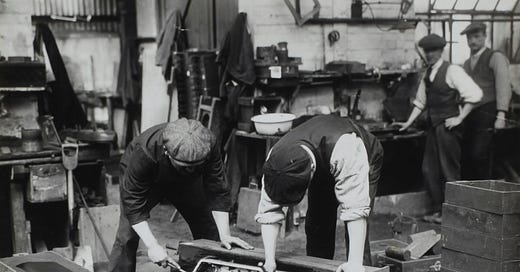We live in unprecedented times. Since the advent of the Industrial Revolution, there has been an extraordinary decoupling of family and work life. We are far more accustomed to thinking in terms of "work-life balance" than our forebears ever were. Today, we feel the pressing tension between the demands of family and the demands of career.
These two spheres often seem like they're locked in a zero-sum war, each competing for the same limited bandwidth of attention, energy, and presence. The tension between family demands and vocational obligations feels like a daily contest between two rival kingdoms.
But it wasn’t always so.
Historically, family and work were more integrated. A man’s work was often at or near his home—on the farm, in the workshop, or at the village market. Fatherhood and craftsmanship, provision and presence, were bound together in tangible and spiritually formative ways. Fathers and sons worked side by side, and the home was a center not only of nourishment and nurture but also of production, instruction, and worship
The Industrial Revolution ruptured this delicate harmony. Men left the land for factories. Provision came at the cost of presence. And slowly, subtly, the male role in the household began to erode. A man who once tilled the land alongside his son was now toiling for 16 hours in a factory, disconnected from his wife’s daily rhythms and his children's formative years.
Karl Marx famously decried the economic alienation of factory workers, but he said little about the profound social, spiritual, and emotional alienation that men experienced, especially in the home.
The result? A black hole.
This slow exile from the home subtly but powerfully undermined male headship. As men were physically extracted from domestic life, authority and leadership slowly shifted. Long before women became "boss ladies" in the corporate world, they became the default managers of the home. Out of necessity, they filled the void—making decisions, nurturing children, and stewarding the home. This was not a feminist coup but a survival mechanism. Consequently, women assumed roles and responsibilities never formally entrusted to them, but which they had no choice but to fill in the long shadow of their husbands' absence.
Men did not just leave the home; they ceded their spiritual responsibility in it. In the silence left by the absent father, they governed. In the void left by the unseen husband, they ruled. This wasn’t an act of rebellion—it was the natural result of a vacuum. For wherever God-given authority is abdicated, it will inevitably be usurped.
"When men abdicate God-given authority, that authority is not erased—it is usurped."
The factory may have produced wealth, but it also hollowed out households. Men were reduced to cogs in an impersonal machine—expendable, replaceable, absent. And the home, once the forge of civilization and catechesis, became male-optional. The domestic sphere—God’s first institution—was hollowed out. And in doing so, men lost their central role as culture-makers and kingdom-builders.
Make no mistake: homemaking is not women’s work. It is human work. It is kingdom work. It is man’s work, too.
When men were ripped from their homes, they were also ripped from the very space where they were formed and where they were meant to form others. They lost touch with the daily rituals that transmit values and faith. They outsourced spiritual instruction. They lost the art of hospitality. And slowly, they lost their dominion.
If the Industrial Revolution mechanized men, the digital age is disintegrating them. But the solution is not to abandon culture—it is to reclaim it by returning to the domestic front as husbands, fathers, and brothers. This requires radical repentance—a joyful rediscovery of God’s cosmic and redemptive design of home-making.
Because culture-making starts at the dinner table.





Truly, I believe the Industrial Revolution is at the heart of so many of our problems. Breaking apart the family, pushing us deeper and deeper toward individualism, destroying our health and our world. People like to tout the benefits, but I’m not convinced they outweigh what they’ve destroyed. And if you look historically, so many detrimental ideologies were developed during this time period.
But, practically speaking, what do you suggest families do to fight back against this?